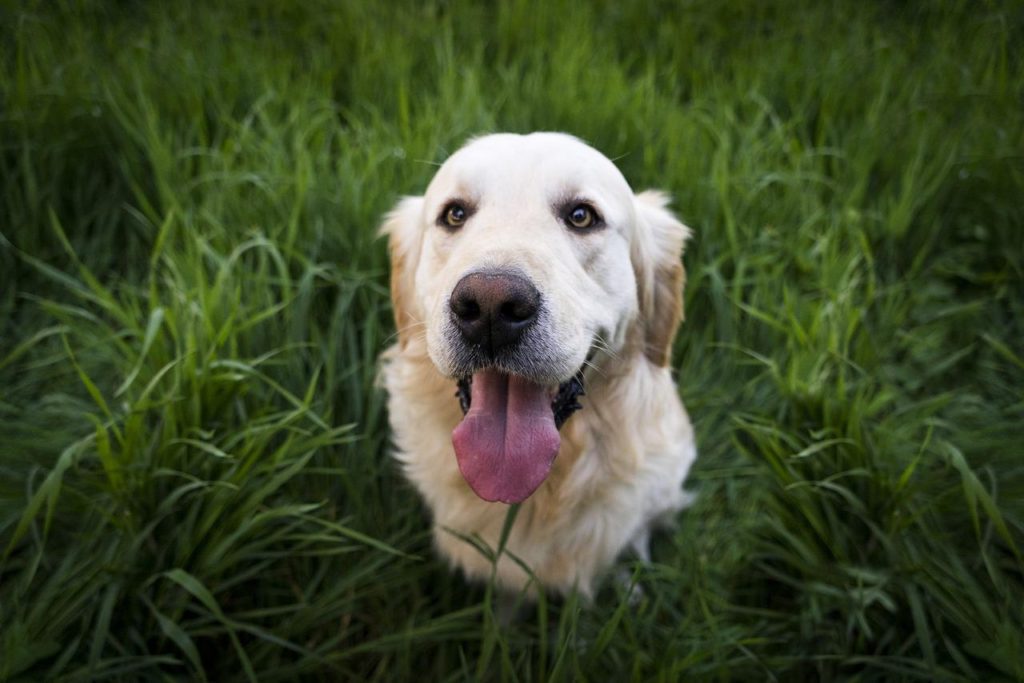Many dog owners are worried that their dogs are eating grass to purge and make themselves ill because they are sick, have a stomachache, or are deficient in vitamins or minerals. Here are 4 reasons.
They like the taste of it:
Your dog might just enjoy the taste and texture of fragrant, wet grass in her mouth, especially when new grass is emerging for the first time during the spring, or when your dog is thirsty. Dogs eating grass can simply mean they are lacking fiber in their diet. Like humans, dogs need a lot of fiber, and if they’re not getting it from their food or through other outside sources, then they may turn to grass.
Instinct:
Grass eating is thought to be a normal habit inherited from wild dogs from a long, long time ago. For dogs back then to survive, they would have needed good hunting abilities in order to survive as a pack. Grass eating may have evolved to help conceal their scent from their prey. Over time, dogs have evolved to become omnivores – like us humans – which can explain why they still have an appetite for grass.
To gain attention or ease boredom
One reason for dogs eating grass that often goes unspoken is the potential that a dog is simply taking part in a forbidden behavior as a means to gain attention or out of boredom. In cases where owners are simply not providing their dog with enough interaction and exercise, the dog may try to interact with its owner by engaging in forbidden behaviors. As with younger children, attention is attention, and a dog that eats grass may be trying to tell its owner that it needs more attention.
Activities that help stave off boredom include increased socialization, physical exercise, and mental stimulation. Some boredom-busting activities include more frequent walks, dog park visits, doggy daycare, dog training, and dog sports.
Self-medicating:
Many reasons why your dog eats dirt are the same as why they eat grass too. These include behavioral issues, stomach upset. Dogs might turn to eating grass when they don’t feel well. Grass blades can tickle a dog’s throat, which may help them vomit. Which, in turn, can get rid of whatever’s bothering them and help them feel better. If a dog is trying to naturally get rid of a gassy or upset stomach, grass may do the trick. It is essentially the same for eating dirt.
However, although it may look like your dog’s eating dirt, they might actually just be digging in it. If your dog smells something wonderful in the soil, they’ll use their nose to aid with the digging and to help with locating the item in question. If it’s in your back garden they’re doing this, they may be hunting for their own buried treasure!
Is it ok:
Grass eating is a normal behavior for dogs and it’s not a concern unless they’re doing it excessively. If they start ingesting a lot and don’t seem okay in themselves or are repeatedly eating grass and vomiting over a period of a few hours, it’s time to contact your vet. If your dog likes to graze in your garden, make sure that it’s not sprayed with pesticides or any chemicals that could be harmful to your dog. And be on the lookout for poisonous plants too. It’s not unusual for dogs that love to munch on vegetation to sample other plants, some of which may be hazardous.
If you are still concerned about your dog eating grass, we would recommend that you discuss it with your vet, just in case. They’ll be happy to check your dog over for peace of mind, so you can carry on enjoying each other’s company with no worries.
What to look out for:
Look for other indicators of a gut flora imbalance or gastrointestinal pain in your dog if he prefers grass.
Coprophagia (eating their own or other dogs/animals’ feces)
1. Poorly shaped stools that are difficult to pick up 2.
3. An excessive amount of wind
4. Indigestion, licking of the lips, or belching
5. Bad odor
6. Vomiting or bile excretion
7. Unable to settle, stretching and glancing around at their stomach
9. Itching and scratching
10. Paws, legs, and tummies licking
11. Increased attention seeking or vocalization as a result of spending time alone
12. Reacting aggressively to other people or dogs
If you have any concerns about your dog, you should always consult your veterinarian first to rule out illness, especially if grass chewing has become habitual or excessive.
Who can help:
Asking a Practitioner of Botanical Self Selection (Zoo pharmacognosy) to work with you and your dog is a safe, effective approach to offer your dog the safest way to top up on nutrients to support well-being or bring him back to health.
Botanical Self Selection is based on the idea that animals have an innate sense of ‘knowing’ when they have physiological imbalances (like grass eating). By allowing your dog to choose from a variety of dried herbs, nutrients, clays, fragrant hydrosols, and essential oils, you are allowing them to determine the plant extracts they require to rebalance.–

